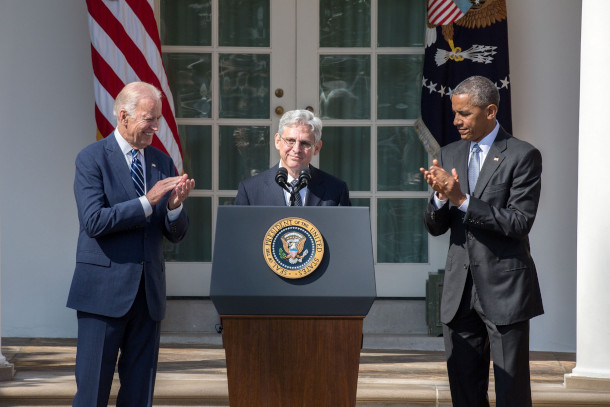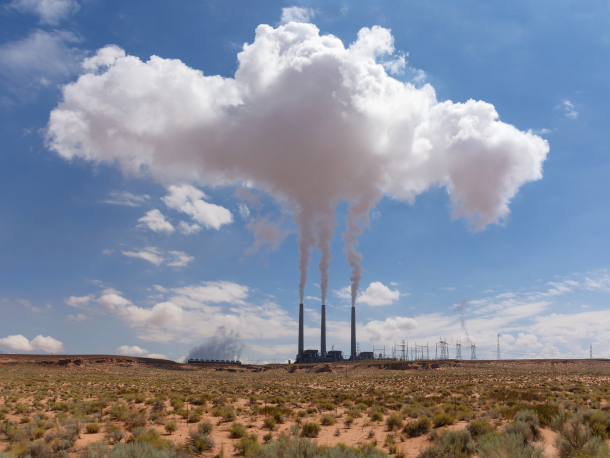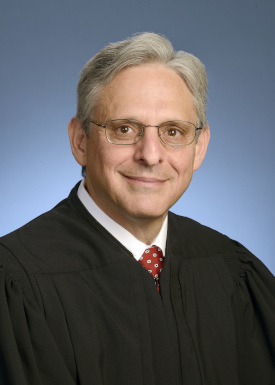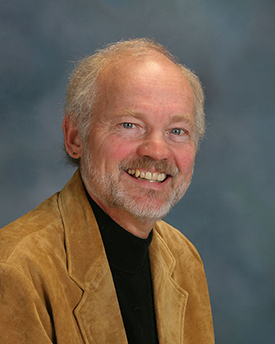Merrick Garland and the Environment
Air Date: Week of January 15, 2021

Judge Merrick Garland was nominated by then-President Obama to the Supreme Court in 2016, but his nomination process was delayed and eventually expired at the end of the 114th Congress session. (Photo: Chuck Kennedy, Official White House Photo, Wikimedia CommonsPublic Domain)
President-elect Biden announced his choice for Attorney General, naming Judge Merrick Garland, who has served on the U.S. Court of Appeals in DC for over 20 years. In his position as chief judge, he's ruled over many disputes relating to environmental rules and regulations. Vermont Law School Professor Pat Parenteau joins Host Steve Curwood to offer some perspective on what an AG Garland could mean for environmental policy and enforcement.
Transcript
BASCOMB: From PRX and the Jennifer and Ted Stanley studios at the University of Massachusetts Boston, this is Living on Earth. I’m Bobby Bascomb.
CURWOOD: And I’m Steve Curwood.
The chief judge of what many call the nation’s second highest court has been tapped by President-elect Biden to serve as attorney general. Merrick Garland has spent more than 20 years on US Court of Appeals for the DC Circuit, which is the exclusive venue to resolve many disputes relating to environmental rules and regulations. In 2016 Senate Republicans blocked Judge Garland’s nomination by President Obama to the US Supreme Court. But when Democrats take charge of the Senate on January 20th Merrick Garland’s confirmation as attorney general seems likely to breeze through. Vermont Law School Professor Pat Parenteau, joins us now for a look at Judge Garland’s record. Hey Pat, welcome back to Living on Earth!
PARENTEAU: Hi, Steve, good to be with you.
CURWOOD: Pat, what's the motivation for Mr. Biden to select Merrick Garland?
PARENTEAU: Well, Garland is a brilliant legal mind, who's known as a centrist or moderate. He's got deep experience, having been at DOJ and of course, most recently as the chief judge of the powerful DC circuit. I think the other thing is Garland is the kind of steady hand that's going to revitalize the Department of Justice. I mean, that place has really been demoralized. In addition to all the bad policy decisions that have been made at the top, that whole staff of lawyers at DOJ, some of whom I know very well, are waiting to be liberated. And I think Garland has the kind of stature and integrity to do that.
CURWOOD: Merrick Garland, the chief judge of that DC Circuit Court of Appeals, to what extent does moving him over to be AG mean that Mr. Biden will be able to appoint a much younger person as chief judge?
PARENTEAU: Yes. And I'm sure that President Biden, who will be President at that point, will take full advantage of that. And that underscores the importance of those two Georgia Senate races, because now the ability to get the appointments to the bench through the Senate is much easier. There's no longer a filibuster, to stop or to require a 60 vote margin to confirm judges. So I'm sure that Biden has another list that's being prepared of replacements for Garland once he goes over to DOJ.

Over the past few years, one of the biggest cases at the US Court of Appeals for the DC Circuit has centered around the Obama Administration’s Clean Power Plan. (Photo: Myrabella, Wikimedia Commons, CC BY-SA 4.0)
CURWOOD: Pat, this isn't typically an environmental issue, but I have to ask you, about Merrick Garland's background as a prosecutor of the Oklahoma City bombers and the domestic terrorism movement and what time and attention he'll now be able to give to that, becoming Attorney General of the United States?
PARENTEAU: Yeah, he's coming at a critical point in our history, that's for sure. And he's got the kind of background to lead the department. And, you know, the thing about Garland is, you're not going to get any spin, or politics. He's a straight shooter when it comes to making independent judgments and being completely transparent. One of the things that marks his demeanor from the Court of Appeals is, he's one of the few judges who's written almost all of his opinions without dissent. He works really hard to convince even more conservative judges of his point of view. And I think when it comes to managing the role of the Department of Justice in dealing with domestic terrorism, which is, unfortunately, on the rise in America right now, you know, it's that kind of steady, predictable, focused on the law, focused on the Constitution, making sure that the government is doing what the government is supposed to do. A lot of the kind of public reassurance that I think we're looking for, Garland is the kind of person to deliver that.
CURWOOD: So, what has been his Environmental record as Chief Justice with the US Court of Appeals for the DC circuit?
PARENTEAU: He's got a strong record on the environment, he's got a deep respect for science. When you read a Garland opinion, reviewing these really technical rules that an EPA adopts under the Clean Air Act, Clean Water Act, and other statutes, you can see right away that he digs into what's the problem in the case, the environmental problem, and how is the law trying to address it? And how did the Agency discharge its responsibilities? He's the kind of judge that if you do your homework, and you've prepared a really good strong record, based on science, he will uphold the Agency. He looks at both the text of these statutes and their purposes. But he's also quick to overturn the Agency when he detects that they have not fully followed the science, haven't listened to their internal experts, for example. He overturned EPA's rule on fine particulates, for example, which is a very dangerous form of air pollution that causes all kinds of respiratory problems. And so in that particular case, he dug into the record, and he found out that the decision makers at EPA did not follow the scientists within the Agency. And he overturned them and send it back and it produced a stronger rule.

Merrick Garland has served on the US Court of Appeals for the District of Columbia circuit since 1997. He has been the chief judge there since 2013. (Photo: United States Court of Appeals for the District of Columbia Circuit, Public Domain)
CURWOOD: Now, what's going to be some of Judge Garland's responsibilities as Attorney General vis a vis the environment? What will he be astride?
PARENTEAU: He's gonna be riding a bucking bronco, I guess you'd say because he's faced with two dozen, at least, major environmental cases challenging rules of the Trump administration, on you know, clean energy, clean air, clean water, endangered species right down the list. There's a very, very long list. So one of the first things that he's going to have to grapple with is changing the position of the Department of Justice in these cases. That's a delicate dance, because the government under Trump has taken a position in these cases. And now Garland is going to have to review and find a way if it's, you know, permissible for the government to extract itself from that position, take these rules back, redo them, and then defend a new set of rules. I haven't seen that in my career spanning now, four and a half decades, I've never seen a situation where the Department of Justice is going to be faced with having to reverse its position in so many cases, and it's gonna have to be done very delicately. That's one big thing he's facing. Another one; we've seen evidence now that the enforcement of environmental laws across the board has gone down, but in particular, criminal enforcement has all but disappeared. There just simply hasn't been any vigorous enforcement of the criminal offenses of environmental law in the Trump administration, under William Barr, and so forth. So he's gonna have to stand up and deploy the whole, you know, staff of lawyers and inspectors and investigators to recreate the criminal enforcement program
CURWOOD: He certainly has a full plate coming in. And you sound enthusiastic about his nomination for this position.
PARENTEAU: I am enthusiastic, I mean, he is not really aggressive, I would say. As a judge, he was not, you know, as green as someone like J. Skelly Wright or David Bazelon, who preceded him in the DC circuit and wrote some of the seminal environmental decisions in our, our jurisprudence. But what I like about Garland is he's fair, he's open, he can be persuaded, he makes you do your homework. And I can't complain about that. And in fact, I think that probably gives him more credibility than someone who might be perceived as leaning towards the environmental position in every case. I think that probably stands the Department of Justice in good stead. He needs to, you know, tell the troops to follow the law, follow the facts, be honest, be open, and do your job. And so for that reason, I'm very excited to see Garland. He's got the kind of experience to really lead the Department of Justice, and back up the environmental enforcement branch of DOJ, when the inevitable political backlash happens. When DOJ starts to change its position in some of these cases, and take a more aggressive role in enforcing environmental law against major corporations in the country, for example, you know, there's going to be pushback coming. And having somebody who understands that, and who not only is prepared to defend the department, but to make sure that what the department has done is defensible, is incredibly important.

Former EPA Regional Counsel Pat Parenteau teaches environmental law at Vermont Law School (Photo: Courtesy of Vermont Law School)
CURWOOD: Part of President-elect Biden's climate plan is to create an Environmental and Climate Justice Division within the Department of Justice. What do you think we can expect to see from this division? And how might Judge Garland manage this?
PARENTEAU: Yeah, it's going to be interesting to see if he creates what appears to be a special section of DOJ devoted to enforcement of what are called, you know, disproportionate impact on Black, Brown, low-income communities that, of course, have suffered from frankly, institutional racism, even under environmental law. You know, I hate to have to admit that as an environmental law professor, but it's true. You know, the siting of facilities, the lack of enforcement of basic environmental, air and water quality laws in communities, is rampant. Flint, Michigan is just, you know, one of the symptoms of a much deeper problem of the lack of environmental law really protecting these very vulnerable communities. So when he creates this section, it'll be interesting to see who he appoints to be the head of that. One person that I think is going to be in the running is Patrice Simms, who's with the Earthjustice organization and has been on the transition team for EPA. A very, very well respected Black attorney with with a great record of accomplishment, and a keen understanding of what this kind of office could do, including things like bringing, you know, class actions on behalf of large segments of communities that have been suffering from these disproportionate impacts and not, you know, favoring big industries, simply because they have such political and economic clout, not being afraid to take on, you know, the biggest polluters out there, instead of giving them immunity, which is what the Trump administration did during the COVID crisis. I can see Garlad and this new unit, becoming kind of a leading edge of enforcement and prioritizing enforcement actions. You can, having been at EPA myself, I know that you can, you know, you can dilute your effectiveness by trying to enforce too many of the smaller violations. The real impact of environmental enforcement is when you can bring to bear the maximum ability of the federal government to correct really serious environmental problems where people are dying from exposure to air and water pollution. And I think we can begin to see that kind of focus and concentration coming out of a Garland-run DOJ.
CURWOOD: Pat Parenteau is a professor of environmental law at Vermont Law School. Pat, thanks so much for taking the time with me today.
PARENTEAU: It was a pleasure, Steve. Thank you.
Links
Grist | “How Merrick Garland Could Figure Into Biden’s Climate Plans As Attorney General”
Living on Earth wants to hear from you!
Living on Earth
62 Calef Highway, Suite 212
Lee, NH 03861
Telephone: 617-287-4121
E-mail: comments@loe.org
Newsletter [Click here]
Donate to Living on Earth!
Living on Earth is an independent media program and relies entirely on contributions from listeners and institutions supporting public service. Please donate now to preserve an independent environmental voice.
NewsletterLiving on Earth offers a weekly delivery of the show's rundown to your mailbox. Sign up for our newsletter today!
 Sailors For The Sea: Be the change you want to sea.
Sailors For The Sea: Be the change you want to sea.
 The Grantham Foundation for the Protection of the Environment: Committed to protecting and improving the health of the global environment.
The Grantham Foundation for the Protection of the Environment: Committed to protecting and improving the health of the global environment.
 Contribute to Living on Earth and receive, as our gift to you, an archival print of one of Mark Seth Lender's extraordinary wildlife photographs. Follow the link to see Mark's current collection of photographs.
Contribute to Living on Earth and receive, as our gift to you, an archival print of one of Mark Seth Lender's extraordinary wildlife photographs. Follow the link to see Mark's current collection of photographs.
 Buy a signed copy of Mark Seth Lender's book Smeagull the Seagull & support Living on Earth
Buy a signed copy of Mark Seth Lender's book Smeagull the Seagull & support Living on Earth

